In a year of transitions, the 2022 General Assembly session starts tomorrow. Three days before Governor-elect Youngkin is sworn in, the legislative session will begin with the swearing in of newly elected delegates, and leadership will be taken by a new Republican Speaker of the House who will establish membership and structure of this year’s House committees. Before getting into the nitty gritty in this first of several posts to share over the next two months, I hope you will join me in sharing a moment of reflection of the many years of legislative updates that longtime board member and advocacy chair Bud Vye, who passed away last year, gave us. In times of hope and in times of loss, Bud would get up early most mornings, put on a suit, and head down to the 7am subcommittee meetings where he was often the only bicyclist advocate. At the end of the day, on top of joining organizing calls and reading committee dockets, he would sit down at his keyboard to share with us sharp insight and wit about the procession and what was ahead.
I hope VBF’s posts this year will live up to his legacy of service. Thanks in advance for reading a pretty packed post.
Bills
In the days before session, bills often lag in the legislative database, so these are the bills we have seen so far. As new ones are posted, we will add them to our online bill watcher.
Budget: $245 million Outdoor Recreation Budget, $233 million of which is for multi-use trails
Truly the biggest priority this year is the unprecedented investment in trails proposed in Governor Northam’s outgoing budget. We were thrilled to see $5 million proposed last year, which ultimately was negotiated up to $10 million, the first time trails have had a dedicated, if only for one year, state budget. This year, the proposal is 23x that amount. Influencing the budget is trickier than bills, as it doesn’t go through public committees in the same process. The hearings for the budget were last week, and VBF board members and organizational members attended all four meetings to support trails.
Of note, $26mil would come from our current budget year, FY22, as an amendment, and $207mil would be for next year, FY23. If that’s a little complicated, don’t worry about it, this is very good. The smaller budget is specific to three of the primary ongoing trail projects in Virginia with very good regional spread: the Shenandoah Valley Rail Trail in western Virginia, the Fall Line in Central Virginia, and the Eastern Shore Trail in, well, you guessed it. The larger future budget names these trails, but not exclusively, and the general understanding is that those monies would be directed by the Commonwealth Transportation Board.
SB 116 (Norment): Increases penalty for bicyclists failing to stop
This one came as a shot across the bow. It would increase the penalty to bicyclists, specifically singling them out, for failing to stop at a stop sign. As written, it would create an additional $500+ penalty on top of the normal failure to stop penalty, making failing to stop as a bicyclist one of the most expensive and egregious penalties on the books. Laughably, it would also require impounding the bicycle for 6 months, a true absurdity that is far beyond what the code requires for drunk drivers (who killed 238 people in Virginia last year).
If you’re reading this, you already know that bicyclists and drivers have been shown to break the law at similar rates, that bicyclists treating a stop sign as a yield actually improves safety outcomes, and since bicyclists know that they lose the fight with drivers, we avoid crashes like the plague. For what it’s worth, a Virginia DMV report given to the Virginia State Police Safety Stop Study completed last month found 0 bicyclists fatalities resulted from bicyclists failing to stop or disregarding a sign from 2016-2020. Actually the largest percentage of bicyclists who were killed in traffic had “no improper action”. If we want to improve safety, bicyclists should be allowed to safely yield at stop signs.
Senator Norment from James City County spoke at length against last year’s Bicyclist Safety Act, in particular the Safety Stop, because of his annoyance of bicyclists near his home. Norment has been in Republican leadership as Majority Leader and now Minority Leader for some time and has served in the General Assembly since the 90s. He doesn’t typically patron many bills and in this case just wants to set us chasing our own tails.
Let’s keep cool heads, stay respectful, and play our cards right to beat this bill. The need for this bill is specious at best, law enforcement will assuredly speak to not having the resources to impound bikes, and this kind of code is without precedent in the code. At the same time, Norment serves on Senate Finance and Appropriations and will have a lot of weight in budget negotiations.
How to effectively influence these bills
- Sign on to the joint letter by Virginia Bicycling Federation and Virginia Trails Alliance. Seriously, we are trying to get at least 5,000 signatures across the commonwealth. Share it far and wide, sign up your willing family members, and beyond. Get it to local businesses and organizations who are supportive of trails.
- Always let your senator and delegate know your priorities. Who’s my legislator? Emailing is the easiest. Calling their offices as a constituent is very influential. Setting up a 15 minute meeting with other constituents and your local bike/ped/trail group is probably the best you can do. Let us know if we can help.
- Use good talking points! We will keep regularly updated list at this shareable shortlink:
- Speak, virtually or in person, at appropriate committee hearings. We will share action alerts as they come available, especially on our Facebook or Twitter.
Email a thoughtful, brief summary of the bill or issue you support or oppose. You don’t have to overthink it! But here is some additional guidance.
Be positive and polite – you want their staffer to feel good about receiving your email. Be realistic – one-off ideas almost never change anything as the session is flying by at supersonic speed. If your statement aligns with an organization you officially represent, identify your organization. If not or you are not sure, it’s better not to name the organization. Strategically, it is never a good idea to paint bicyclists in a bad light. There is nothing effective about saying “some bicyclists blow stop signs”, just trim that part out. It’s doesn’t help you level with decision makers or buy you any credibility, actually just the opposite. Another fun fact, aides are unlikely to open an attachment, so don’t bother.
Appropriations
Legislators on appropriations have an outsized role in deciding the budget. At this stage, they can only amend the Governor’s budget. Importantly, expect and brace yourself that one or some legislators will propose amendments that strip the Outdoor Recreation budget – our goal is to keep it intact.
If your legislator serves on House Appropriations (soon to be updated) or Senate Finance and Appropriations, your contact will be especially valuable.
Around February 20, we will see the House and Senate versions of the budget, and whatever amendments that might change the trails funding. They will differ, which means the budget will go to conference where it will be decided behind closed doors by selected budget conferees. Typically conferees are the chairs of the money committees, party leadership, and other senior legislators with statewide representation. You can bet Norment will be among them, as will outdoor supporter (and co-chair of the Virginia Outdoor Recreation Caucus )Senator Emmett Hanger, R-Augusta. When conferees are chosen, we will share an update.
Senate Transportation
The Stop Sign bill is assigned to this committee which meets Thursday afternoons (15 minutes after adjournment). That has been a fairly supportive committee, passing the Bicyclist Safety Act twice (House and Senate versions). Contact your senator if on that committee. It has not been docketed yet (meaning we don’t know the date it will first be heard), but we will post updates as more information becomes available.
Looking ahead
- Legislative organizing calls are every Sunday at 7pm and hosted on Zoom. Email president@vabike.org to request login details. We had a great turnout last week!
- House transportation bills go through Subcommittee, then Committee, then the full House. Testimony is only allowed at the subcommittee level. Senate transportation bills start in committee where testimony is allowed before going to the full Senate. Representatives of organizations and associations and administrative experts tend to be who legislators look to hear from in hearings, so focus your efforts on contacting your legislators directly via email, call, and direct meetings (often with staffers, and that’s okay).
- Crossover is February 9, meaning Senate bills like the Stop Sign bill will cross over to the House and vice versa, and the process unfolds again.
Thanks for making it this far. If you knew Bud, you know he would be tickled pink at the chance to see Virginia invest in trails so heavily. I hope you will remember his calls to action to support this once in a lifetime opportunity.
Brantley
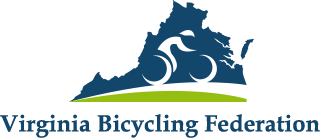
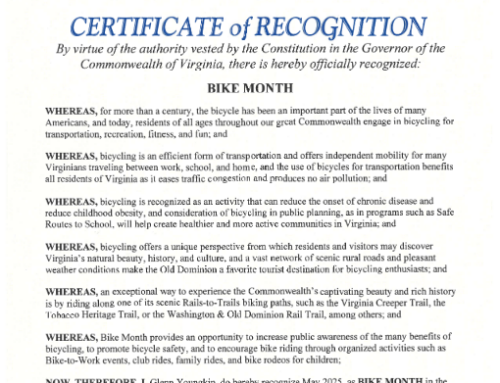
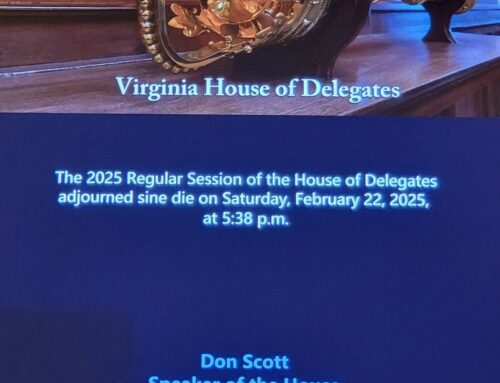
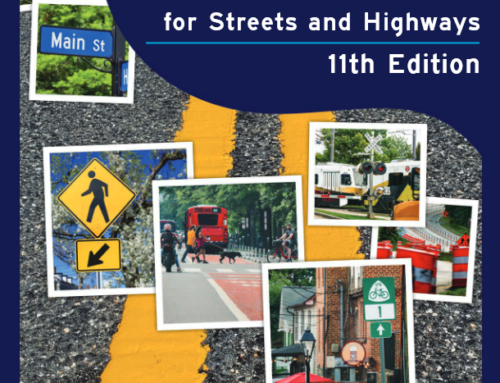
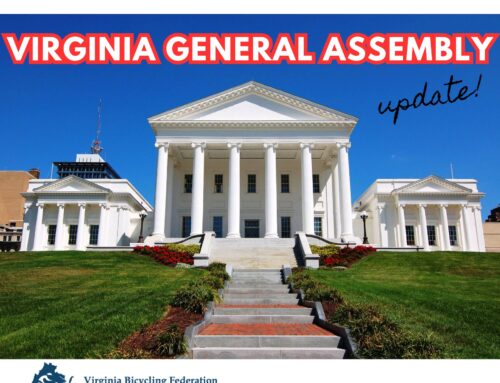
SB116 would inordinately punish lower economic peoples, some of whom depend upon the bicycle as their sole form of transportation. What problem is this bill proposing to fix exactly? Is it perhaps an anecdotal experience of a single VA lawmaker who had a cyclist run a stop sign, therefore wants to target bicyclists because they’re all equal offenders??